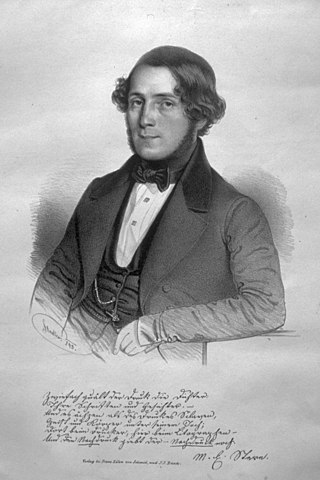Related Research Articles
In early modern Europe, particularly in Germany, a court Jew or court factor was a Jewish banker who handled the finances of, or lent money to, royalty and nobility. In return for their services, court Jews gained social privileges, including, in some cases, being granted noble status.

Moritz Steinschneider was a Moravian bibliographer and Orientalist. He received his early instruction in Hebrew from his father, Jacob Steinschneider, who was not only an expert Talmudist, but was also well versed in secular science. The house of the elder Steinschneider was the rendezvous of a few progressive Hebraists, among whom was his brother-in-law, the physician and writer Gideon Brecher.
Solomon Löwisohn was a Hungarian Maskilic poet, historian, grammarian, and linguist.
Joachim Jacob Unger was an Austrian rabbi.

Ludwig August Ritter von Frankl-Hochwart was a Jewish Bohemian-Austrian writer and poet.

Heinrich Landesmann, more commonly known by his pseudonym, Hieronymus Lorm, was an Austrian poet and philosophical writer.

Gustav Heine, after 1870 Gustav Freiherr Heine von Geldern, was a German-Austrian journalist and press publisher.

Heinrich Grünfeld was a Bohemian-Austrian cellist; a brother of Alfred Grünfeld. He published his autobiography, 'In Dur und Moll' in 1923, an historically important source for Brahms, Joachim, and Richard Strauss.

Samuel Siegfried Karl Ritter von Basch was an Austrian-Jewish (Yekke) physician who was best known as the personal physician of emperor Maximilian of Mexico and the inventor of the blood pressure meter.

Meïr Halevi (Max) Letteris was an Austrian poet, editor, and translator of the Galician Haskala. He translated into Hebrew works by Virgil, Lucian, Jean Racine, Lord Byron, Johann Wolfgang von Goethe, Friedrich Schiller, Ludwig August von Frankl, and others.

Simon Deutsch was an Austrian Jewish bibliographer, businessman, and revolutionary. He was an important member of the First International and a veteran of the Paris Commune.
David Assur Assing was a Prussian physician and poet.
Bernhard Münz was an Austrian writer, philosopher, and librarian.

Max Emanuel Stern, also known as Mendel b'ri Stern, was a Hungarian-born Hebraist, writer, poet, and translator.

Sidonie Josepha Grünwald-Zerkowitz was an Austro-Hungarian writer, poet, translator, educator, and fashion designer.

Baruch Jacob Placzek, also known by the pen name Benno Planek, was a Moravian rabbi, author, poet, orator, and naturalist. He was the last Landesrabbiner of Moravia, which position he held from 1884 until his death. As a writer, he published numerous sermons, speeches, and obituaries, as well as scientific, lyrical, and narrative works.
Judah ben-Jonah Jeitteles was a Bohemian maskil and Hebrew writer.

Anton Edler von Schmid was an Austrian printer and publisher of Hebrew books.
Moritz Horschetzky was an Austrian physician, writer, and translator.
Wilhelm Duschinsky was an Austrian philologist, educator, and writer.
References
![]() This article incorporates text from a publication now in the public domain : Singer, Isidore; Haneman, Frederick T. (1904). "Herzog, Jakob". In Singer, Isidore; et al. (eds.). The Jewish Encyclopedia . Vol. 6. New York: Funk & Wagnalls. p. 371.
This article incorporates text from a publication now in the public domain : Singer, Isidore; Haneman, Frederick T. (1904). "Herzog, Jakob". In Singer, Isidore; et al. (eds.). The Jewish Encyclopedia . Vol. 6. New York: Funk & Wagnalls. p. 371.
- 1 2 " Herzog, Jakob ". In: Österreichisches Biographisches Lexikon 1815–1950 (ÖBL). Vol. 2, Austrian Academy of Sciences, Vienna 1959, p. 301.